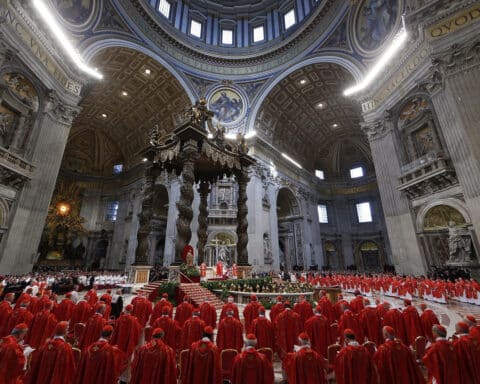Over a series of issues in 2001, Time magazine dared to nominate “America’s best” across a broad range of vocations, professions and talents from virtually every area of life, from scientists to scholars, from entrepreneurs to various artists in a variety of media. As America’s best songwriter, the magazine chose a late-blooming and relatively unknown musician named Lucinda Williams. This was three years after then 45-years-old Williams’ breakthrough album, “Car Wheels on a Gravel Road,” and the same year as her critically acclaimed subsequent album, “Essence.” America’s best theologian, Time declared, was Stanley Hauerwas, the same year that Hauerwas became the first American to give the world’s most prestigious theological addresses, the Gifford Lectures, at Scotland’s University of St. Andrews.
These honors for Williams and Hauerwas were especially satisfying to me. I had already considered Williams to be the best female American songwriter ever, and no theologian has had a more profound in impact on my theological development than Hauerwas. As I wrote in my book, “The American Myth of Religious Freedom” in 1999, “hardly a single page [was] not profoundly influenced by his work … Hauerwas’s contribution to my thought is impossible to quantify.” I could just as easily have said (and probably did at some point), that Williams’s contribution to my appreciation for songwriting is impossible to quantify. Already, I had considered “Car Wheels” and “Essence” to be two of the finest albums in the history of American popular music. Even today, they would both be on any top 10 list I would name.
It is no coincidence that Hauerwas and Williams have been so important to my theological development and musical enjoyment. Both are from the South (Williams from Louisiana, Hauerwas from Texas) and have a deep and abiding sense of the claims that being Southerners have on their way of thinking and writing. This sensibility is manifest in the strong emphasis on narrative in their approaches to their fields. Hauerwas is widely considered the most important advocate and practitioner of “narrative theology,” a methodology that emphasizes God’s revelation of himself (and our experience of him) through stories. And Williams is praised for the thick narrative content of her songs, telling rich, poignant stories about her own life and the lives of others. Through regional images and vignettes, they both tell universal stories about man and God.
Hauerwas published a soul-searching memoir several years ago, called “Hannah’s Child” (Eerdmans, $30.50), accounting for the stories that had formed his life. But other than through images and analogies in her songs, Williams had never written expressly about her own life. Thus, I was eager to open and read Williams’s recent memoir, “Don’t Tell Anybody the Secrets I Told You” (Crown, $28.99), a brief but revealing portrait of her life and career.
I suppose the way that public figures signal that books about themselves will be highly circumspect and selective is to call them “memoirs” rather than “autobiographies.” And calling them memoirs seems also to be a license to include eccentric, seemingly minor or idiosyncratic anecdotes. That certainly is the case with Williams’ book. For example, she spends a disproportionate amount of space discussing her odd association with singer-songwriter, Ryan Adams (another of my favorites), to account for the inspiration of a couple of her songs. I was not aware that Williams and Adams had been so close to one another over the years. Her descriptions of their platonic but (from her perspective) deeply involved emotional relationship serves a prurient interest. But it leaves the reader puzzled about its inclusion at the cost of other details about her life or the background of other songs. For example, Williams never mentions her 2020 stroke, from which she is still recovering. While one can understand her desire to avoid plays on the readers sympathy, the impact of this event on her life and career seems too important to omit.
Despite these quibbles, though, I am grateful that Williams has written her memoir, and have learned much from it. For example, she accounts for the importance of Flannery O’Connor’s novels and stories on her life and career. Indeed, Williams reveals that as a young girl she visited O’Connor in Milledgeville, Georgia, with her father, the poet Miller Williams. Like Hazel Motes from O’Connor’s novel, “Wise Blood,” Williams is the grandchild of preachers. And like the fictional character, Williams’ view of the world was profoundly impacted by the legacy of her two grandfather ministers, one a fundamentalist and the other a liberal Methodist.
More to the point, Williams’ maternal grandfather-preacher abused her mother, which Williams attributes as a cause of her mother’s severe mental illness and history of substance abuse. This, in turn, has shaped Williams’ own views on both religion and the pain of familial relationships, including those with her father. While she omits many details, Williams does not shy from exposing her own faults and weaknesses, nor for her responsibility to overcome them. And, of course, Williams accounts for the struggles to succeed as a woman in what was, early in her career (and is still to a large extent), an industry dominated by male executives who want to impose their wills on female artists.
“Don’t Tell Anybody the Secrets I Told You” is a lyric in a song about one of Williams’s several failed romantic relationships. As the title of her memoir, it is also an invitation to discover how this remarkable woman has survived the slings and arrows to become (arguably) America’s best songwriter. It is a commendable addition to your summer reading list.





